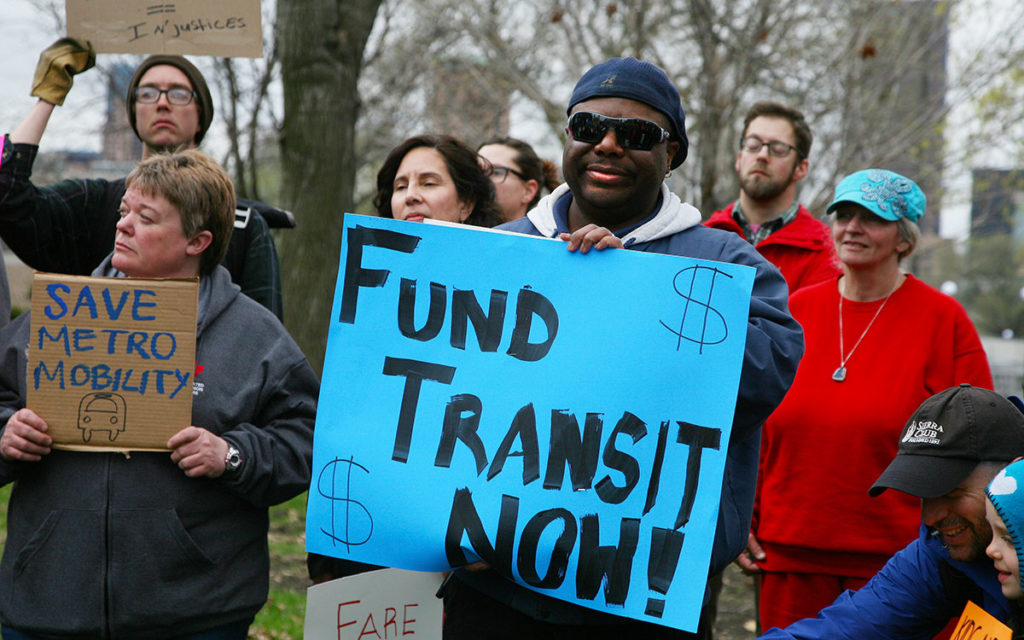2018 Session Recap: Big Defensive Wins and Continued Threats to Transit, Biking & Walking
We closed the 2018 Minnesota Legislative Session this past Sunday night. The past few months have been a whirlwind of activity, with both defensive wins for transportation and missed opportunities by the legislature. Yet again, the legislature refused to spend a single dollar on transit in the metro, and very little in Greater Minnesota. Coupled with a series of bills that attacked transit and bicycling, and continued to push investment in cars over people, this session could have been devastating for our state.
But, together with our supporters and allies, we were able to stop harmful legislation, keep an eye on threatening bills, and raise awareness on both sides of the aisle of the importance of walking, bicycling, and transit.
A MAJOR WIN: STOPPING A CONSTITUTIONAL AMENDMENT THAT PRIORITIZED ROADS OVER PEOPLE
SF 3837 / HF 3925 proposed changing our state constitution to permanently take money from the general fund and instead dedicate it to roads. Not only did it ignore funding options for transportation choices, it would have shifted resources away from needs like education, healthcare, housing, human services, and local government.
Early in the session this bill emerged as a huge and viable threat to many Minnesotans. In response, Move Minnesota convened a broad coalition of cross-sector groups to stop it. Together with your help, we fought back against this harmful legislation.
- Our coalition spoke at every committee hearing on the amendment, coordinated testimony, and spoke with legislators about how this bill would pit transportation against other essential needs.
- Together with 54 other groups, we signed a joint statement opposing the amendment and delivered it to state legislators.
- After hundreds of hours of work and over 630 actions from Move Minnesota supporters, the proposed constitutional amendment was defeated.
Stopping the constitutional amendment now was critical. If it had moved forward to the ballot in November, Minnesotans would have voted on it becoming law. This would have pit roads against walking, bicycling, and transit, and created months of defensive work, distracting from efforts to create positive change.
BUILDING THE MOVEMENT: STRENGTHENING RELATIONSHIPS ON BOTH SIDES OF THE AISLE
This year wasn’t just about the bills at the Capitol. We worked with transportation allies, coalition members, and regional experts to deepen our relationships with legislators across the state and build bipartisan awareness of how transportation deeply affects the lives of Minnesotans every day. With your support, we’re already building toward the 2019 legislative session and bigger, better conversations about walking, bicycling, and transit.
PROTECTING FUNDING FOR WALKING, BICYCLING, AND TRANSIT
This session, legislators introduced dozens of bills that proposed cutting transit money or instituting policy barriers to transit and active transportation. There were also positive bills, such as a hands-free cell phone bill and a bill to fund Safe Routes to School, with the potential to make walking, bicycling, and commuting safer for all Minnesotans. A polarized legislative environment stymied progress on the hands-free bill, but we were happy to see that Safe Routes to School secured additional funding.
OPPORTUNITIES FOR WALKING, BICYCLING, AND SAFER STREETS
The legislature passed $1M in new funding for Safe Routes to School, which will mean more kids and families can safely walk and bike in our communities. Safe Routes has had a backlog for years, with more project requests from schools and communities than funding. Our Transportation Forward partners put forth tremendous effort to ensure Safe Routes to School was included in the bonding bill this year.
Efforts to secure new investment in better bus service and critical bus infrastructure in the metro failed to gain traction. Similarly, despite broad bipartisan support and work from Transportation Forward partners, the legislature did not even get to a vote on the hands-free cell phone bill.
DANGERS FOR TRANSIT & BICYCLING
There were dozens of bills that attempted to slash transit funding or introduce policies that would harm the ability of people to walk, bike, and use transit. These attacks appeared over and over again in a variety of ways. Specific threats included:
- Blocking transit expansion in the metro, including both the Bottineau Blue Line and Southwest Green Line extensions, by banning light rail and freight rail from sharing the same corridors
- Amending the state constitution to take dedicated money away from transit statewide and shift it to highways, and opening the door to additional reductions in statewide transit funding in the future
- Requiring the use of permits for using bike lanes in urban environments, as well as imposing fees for the permits
- Prohibiting use of state funding for capitol maintenance for transit
- Allowing certain cities to co-opt money from Hennepin County transit funds exclusively for their own road and bridge projects
- Prohibiting the Metropolitan Council from maintaining transit with budget reserves
- Imposing sweeping limitations on the Metropolitan Council with negative implications for metro-area transit
- Passing a statewide ride-share policy with the potential to hurt workers and communities
Some of these bills posed more danger than others, but all were on the list of threats that we monitored throughout session. Our network of supporters was critical in contacting legislators when bills gained meaningful momentum. While some of these were included in the omnibus bill, we were glad that most of these efforts failed in the legislature, and the remainder were vetoed by the Governor.
Now that the 2018 session is over, our legislative advocacy team will be focused on expanding our strategic partnerships, growing our network of supporters, and working to raise awareness about the importance of walking, bicycling, and transit across our state.
If you’re interested in getting more involved in our ongoing campaign work, be sure to connect with Theresa Thompson Nix, Field Manager.

